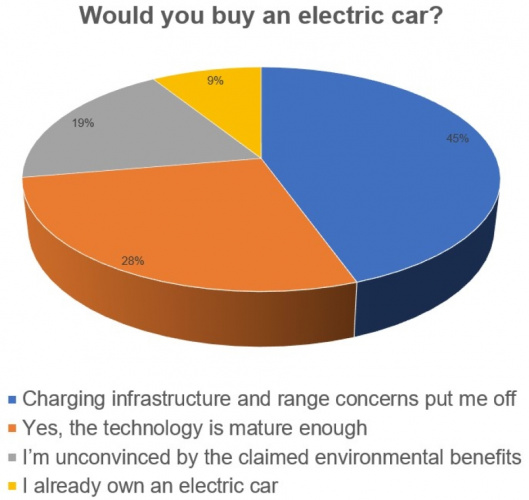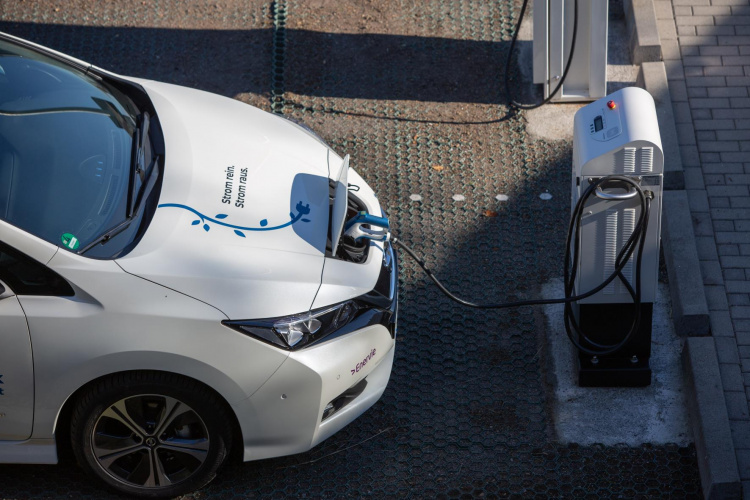37 per cent either considering or already driving an EV
In last week’s online poll The Engineer asked readers whether, given the clear technological advances being made, they would consider investing in an electric car?

With major manufacturers and governments around the world now championing the technology there’s a growing expectation that we are heading towards a tipping point in terms of adoption.
We wanted to find out where the technologically literate readers of The Engineer stand on the issue.
Are you a fully paid up member of the EV revolution? Do you own an electric car? Would you seriously consider buying one or do you have misgivings over the technology such as concerns over range or the availability of charging points?
It proved a particularly emotive question, attracting 1572 votes, and encouraging a lively debate on The Engineer’s website (which you can continue to take part in below the line).
Perhaps unsurprisingly, given the relatively low numbers of electric vehicles in circulation, the largest single response group, 45 per cent (701 respondents) still see range and charging infrastructure as a major barrier to adoption.
“Give it a 600+ mile range (like my diesel) and 5-10 minute recharge and it will be considered” wrote Dr Bob. “Price, Range, Charging Time, Charging Infrastructure: Too many negatives to interest me” added another Another Steve
Phil Ludbrook commented that the only EV that would be practical for him would be out of his price range. “I live in Somerset , but our office is in Norwich which I visit 4-6 times a year. Nothing I’ve seen will get me there in anything other than a very, very long day of many stops, apart from an ‘out of my budget’ Tesla.”
A further 295 respondents (19 per cent of the overall sample) were unconvinced by the claimed environmental benefits of electric vehicles, citing concerns over both the raw materials for the batteries and the generating source for the electricity used to charge the vehicles.
“There are not enough rare earth materials to supply current battery design plus the negative effects of mining damage and their transport is being ignored. Also of course is the problem of electricity supply which if everybody took to electric cars would be woefully inadequate” wrote Geoff Calvert
Some respondents argued that we’ve got carried away with electric vehicles and that we should be pursuing alternative low carbon propulsion technologies . “The alternative green technology of hydrogen seems to be getting a back seat in all this,” said Brian “when it offers many of the befits of electric-rechargeable cars and the ease and range of petrol/diesel cars."

However, a high number of those commenting and voting were more positive about the technology. Over a quarter (28 per cent, or 442 of respondents) were confident that the technology is mature enough for everyday use, whilst nine per cent of our sample group already own or drive electric vehicles.
Alex T is one reader now considering investing in an electric car. “Our run around car is up for replacement and will be replaced by an EV. Sadly there are no useful EV cabrios yet, but I can’t wait to get hold of an EV.”
Brian already owns an electric car. “I have a second-hand, electric only, Nissan Leaf and I love it," he said. "It’s perfect for my journey to work (40 miles round trip) and other short outings. That said, my family couldn’t manage without a larger, standard car, as it is quite impractical to use a small EV for long journeys or for towing etc.”
Ian Cash, meanwhile, is delighted with his electric Hyundai Kona: “I’ve now driven over 4000 miles (mostly longer journeys) and have always managed to charge for free at the destination, or when stopping for lunch”.
With the technology developing rapidly, charging infrastructure being deployed ever more widely, public attitudes shifting, and governments around the world incentivising uptake of the technology it’ll be interesting to see how the balance shifts when we revisit this poll topic next year.




Plasma technique converts landfill methane to jet fuel
Trevor; there are still many landfill sites in the UK where the methane is not captured but not only that, where there is protein waste in them, they...